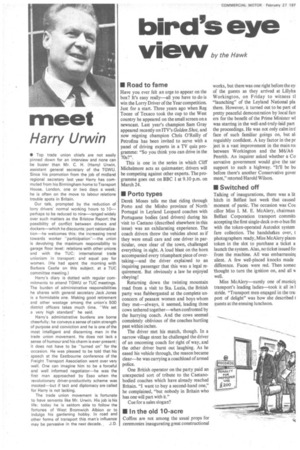meet
Page 38

If you've noticed an error in this article please click here to report it so we can fix it.
Harry Urwin
• Top trade union chiefs are not easily pinned down for an interview and none can be busier than Mr. C. H. (Harry) Urwin. assistant general secretary of the TGWU. Since his promotion from the job of midland regional secretary last year Harry has commuted from his Birmingham home to Transport House, London, one or two days a week; he is often on the move to labour relations trouble spots in Britain.
Our talk, prompted by the reduction of lorry drivers' normal working hours to 10— perhaps to be reduced to nine—ranged widely over such matters as the Bristow Report; the possibility of conflict between drivers and dockers—which he discounts; port nationalization—he welcomes this; the increasing trend towards worker "participation"—the union is devolving the maximum responsibility to garage floor level; relations with other unions and with the TUC; international trade unionism in transport; and equal pay for women. (He had spent the morning with Barbara Castle on this subject, at a TUC committee meeting.) Harry's diary is dotted with regular commitments to attend TGWU or TUC meetings. The burden of administrative responsibilities he shares with general secretary Jack Jones is a formidable one. Making good retirement and other wastage among the union's 500 district officers takes much time. "We set a very high standard" he said.
Harry's administrative burdens are borne cheerfully; he conveys a sense of calm strength of purpose and conviction and he is one of the most intelligent and discerning men in the trade union movement. He does not lack a sense of humour and his charm is ever-present: it does not have to be "turned on" for the occasion. He was pleased to be told that his speech at the Eastbourne conference of the Freight Transport Association went over very well. One can imagine him to be a forceful and well informed negotiator—he was the first man approached by Esso when the revolutionary driver-productivity scheme was mooted—but if tact and diplomacy are called for Harry is not lacking.
The trade union movement is fortunate to have servants like Mr. Urwin. His job is his life; today he is seldom able to follow the fortunes of West Bromwich Albion or to indulge his gardening hobby. In road and other forms of transport this man's influence may be pervasive in the next decade. J.D.




































































































